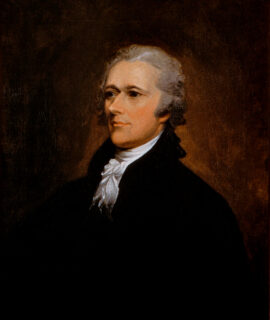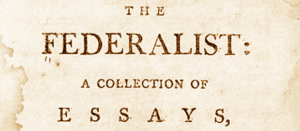
Federalist 17: Should We Love Government?

David Foster, Professor of Political Science at Ashland University, answers the question, “What attaches citizens to Government?” using Federalist 17.
Careful students of American history know the famous essays in the Federalist Papers on faction, separation of powers, and an extended republic. But scattered throughout that great work are many less famous essays containing useful arguments and nuggets of wisdom. A key argument is offered in Federalist 17. Here, while analyzing the defects of the Articles of Confederation, Publius finds occasion to discuss what it is that attaches citizens to government.
After noting the “known fact in human nature” that men are more attached to what is close by and tangible than to what is far away and “diffuse” (to one’s own family, for example, than to one’s community in general or to the nation at large), he argues that more than anything else what impresses upon the minds of the people an affection, esteem, and even “reverence” towards government is the “ordinary administration of criminal and civil justice.” The administration of justice is “the immediate and visible guardian of life and property” and it regulates “all those personal interests, and familiar concerns, to which the sensibility of individuals is more immediately awake.” In other words, the most powerful and universal source of popular obedience and attachment to government is its protection of those things about which we care the most: the things that are closest to us–our own lives, our properties, our families.
Publius made these arguments to put at ease those citizens who feared that the proposed Constitution would create a federal government too strong for the states. Your concerns are misplaced, he says in effect, since human nature and the administration of justice at the state level will always give the states a “transcendent advantage” over the federal government. And yet we can’t help but notice that the states have this advantage only “if they administer their affairs with uprightness and prudence;” indeed, the fundamental principle that we love most what is closest to us favors the states, “unless the force of that principle should be destroyed by a much better administration” in the government of the union. Is Publius hinting that the federal government might protect our lives and property better than the states do, thereby coming to deserve greater allegiance? Or is it that some principle other than the love of our own and familiar things might attach us more strongly to the federal than to the state governments? These questions cannot be answered without reading the second half of the Federalist, where Publius pays much closer attention to virtue, wisdom, and republican liberty than in the first half. But in considering those themes, we must never forget the statement in #17 on the fundamental basis of attachment to government.
It is difficult to say from this distance in time what part these arguments played in persuading critics to support the Constitution. But Publius’ argument is worth reconsidering today, when concerns about the size and reach of the federal government are once again a prominent theme in public debate. Moreover, the reflections in Federalist 17 give an important example of what Publius means in his famous statement that government is the “greatest of all reflections on human nature.”
If you are looking for curated and accessible documents on this subject for your classroom, please check out our CDC volume, The American Founding.
–David Foster, Professor of Political Science at Ashland University

